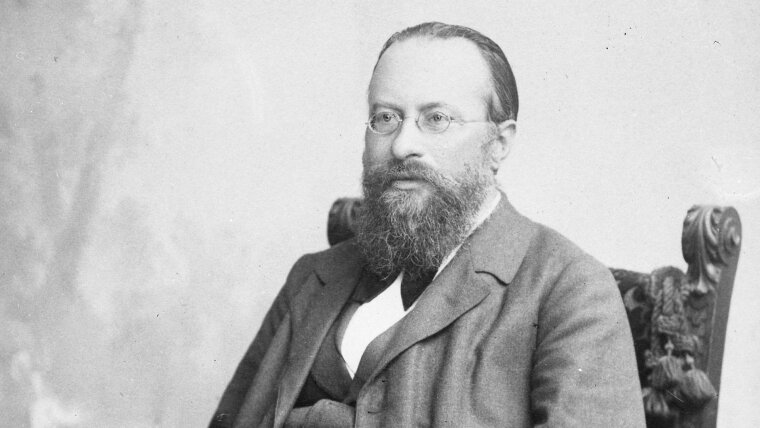
This year marks the 100th anniversary of Berthold Delbrück’s death. The linguist is regarded as an important figure in Indo-European Studies in Germany, who researched and taught at the University of Jena for more than 40 years. He also served four terms as the university’s rector, including in the important anniversary year of 1908.
By Sebastian Hollstein
In his last term of office as »pro-rector« (the equivalent of today’s rector or president), Berthold Delbrück introduced an important innovation that benefited scientists young and old: He allowed professors at the University of Jena to retire at the age of 70, so that they didn’t have to wear themselves out into old age.
This measure, which also brought about a reduction in the average age of teaching staff, was described by Delbrück’s biographer, Eduard Hermann: »This probably gave many people the opportunity to leave their post when they were still fresh in the mind, leaving colleagues and students with a feeling of regret that the step had actually been taken too soon. Because a professor with healthy organs does not tend to age as quickly as other people due to his constant interaction with youth and a profession that he loves above all else«.
And the feeling of regret amongst students and staff must have been great when Delbrück himself retired five years later. After all, the »master of syntax« (Hermann) not only enriched his very young discipline of Indo-European Studies, but also left a lasting impression on the University of Jena as an institution.
Berthold Delbrück was born in Putbus on the island of Rügen in 1842 and moved to Halle/Saale in 1852 following the death of his father, who was a jurist. There he began studying comparative linguistics in 1859. He continued his studies in Berlin from 1861 and finished a year later in Halle. After subsequently taking the state examination, working as a teacher and completing a research stay in St. Petersburg, which resulted in his habilitation thesis, the University of Jena appointed him as an associate professor of Sanskrit and comparative linguistic research in 1870. He was ultimately appointed as a full professor in 1873.
Jena was an early centre for Indo-European Studies
Jena had established itself early on as a centre for the young discipline of Indo-European Studies – mainly thanks to August Schleicher, who became the first linguist to work intensively on the reconstruction of an Indo-European proto-language from 1857 to 1868.
Two years later, Berthold Delbrück started researching Indo-European languages in Jena – and added an important aspect: »Not only did he bring together the knowledge that had been gained within Indo-European Studies up to that point – he also established a completely new field of research with regard to the syntax of Indo-European languages«, wrote his successor, Rosemarie Lühr, in 2011. His colleagues had previously focused exclusively on morphology and phonology.
Some of his writings, such as »Old Indian Syntax« and »Comparative Syntax of Indo-European Languages« are still considered standard works to this day. In his later years, he devoted himself primarily to Germanic syntax. Delbrück frequently ventured into other disciplines such as law, and his research work went hand in hand with his passion for teaching.
The expert in Indo-European languages rubbed shoulders with other important contemporaries in Jena, engaging in lively discussions and even friendships with important scholars such as Ernst Haeckel, Rudolf Eucken, Ernst Abbe and Eduard Rosenthal. He was widely respected for his open-mindedness and many people asked him for advice. At the same time, Delbrück was not free from anti-Semitic ideas, even though he rejected legally entrenched anti-Semitism.
Delbrück was also a political activist. As an admirer of Bismarck, he joined the National Liberal Party and stood as a candidate for them in the 1887 Reichstag election. It was mainly his talent for speaking that got him to the run-off election, which he probably lost due to »fake news«. His competitors spread the rumour that the Liberals had put 20 pfennigs in some ballot papers to help voters make up their mind.
At least this meant that he could dedicate his organizational talent entirely to the University of Jena, where he served as rector on two more occasions after 1885: in the 1897 winter semester and in 1908, when his experience was required to organize the university’s 350th anniversary celebrations. In addition to those celebrations, there were more important dates in 1908 such as the opening of the main university building and the Phyletic Museum. Over the course of the festivities, Delbrück was named an honorary citizen of the city of Jena.
Even after his retirement in 1913, he continued his academic work, publishing writings and holding lectures until 1921. However, an eye condition that had plagued him for several decades made his everyday life increasingly difficult. Berthold Delbrück died in Jena on 3 January 1922.